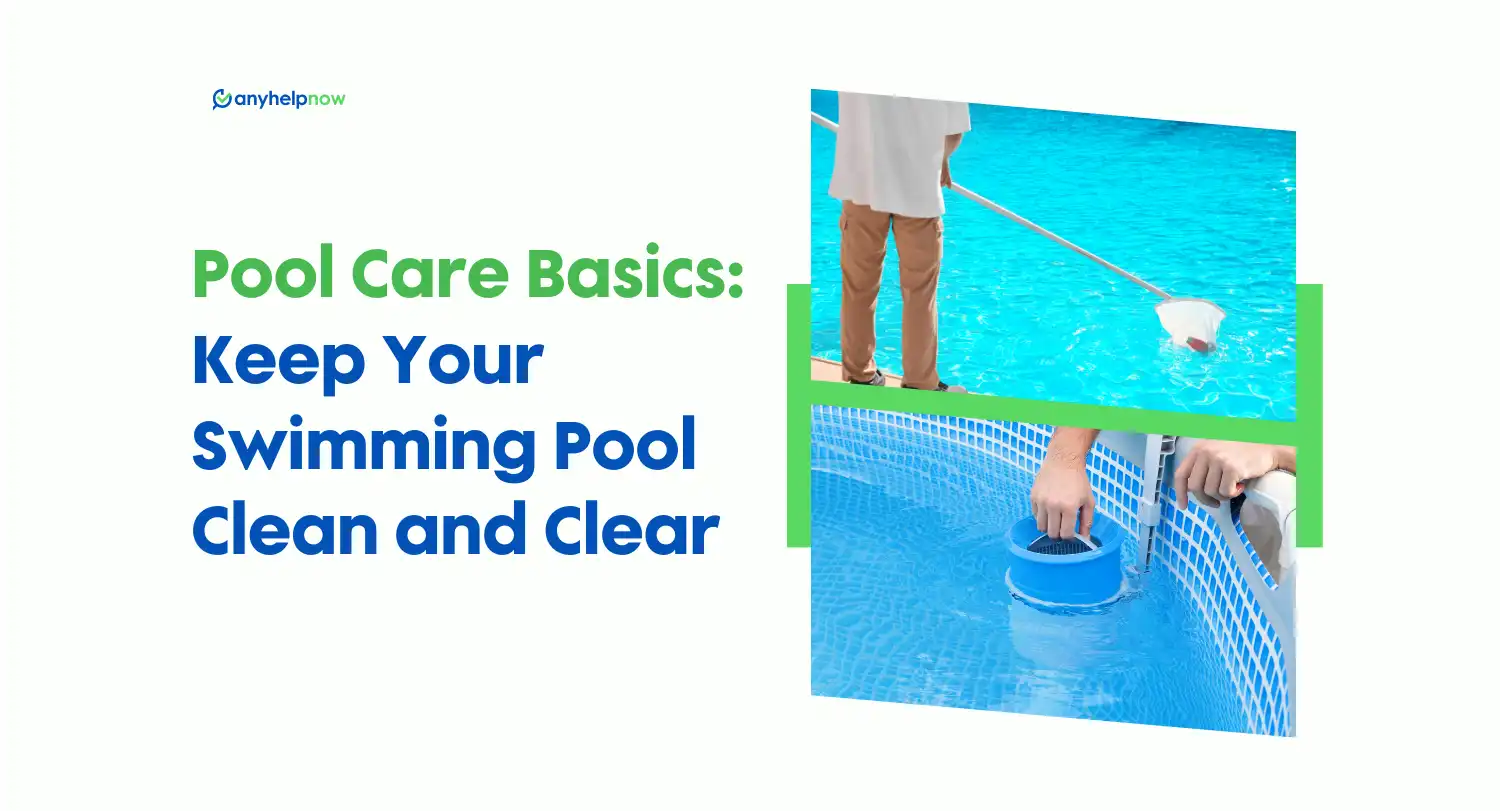Ah, having your swimming pool - the ultimate backyard luxury. There's nothing like a dip in your private oasis on a hot summer day. However, owning a swimming pool is one of those simple joys in life that also comes with responsibilities. Keeping your pool clean, clear, and safe requires regular maintenance and an understanding of some basic pool chemistry and mechanics. But don't worry. With the right knowledge and tools, pool care can be a breeze. This comprehensive guide covers all the pool care basics, from routine cleaning to water testing, equipment essentials, algae prevention, and more. Follow these tips, and you can spend more time enjoying your pool and less time stressing over its upkeep.
Understanding the Basics of Pool Maintenance
Owning a swimming pool is one of life's great joys. However, it also comes with responsibilities. Regular and thorough pool maintenance is key to keeping your water clean, clear, and safe. This requires some work, but it's worth the effort for the peace of mind that comes with regular and thorough pool cleaning and maintenance.
What is involved in routine pool care?
Routine pool care involves a few basic tasks:
Skimming the surface to remove debris
Brushing the walls and floor
Vacuuming the bottom
Testing and adjusting chemical levels
Cleaning the filter regularly
Running the pump and filter system
Depending on how often you use your pool, you must skim and brush 1-3 times weekly. Vacuuming and cleaning the filter is usually done weekly. Chemical testing should happen 1-2 times per week.
How to maintain the proper pH level of your pool
Maintaining the proper pH level (between 7.2-7.8) is crucial for:
Keeping the water balanced and comfortable for swimming
Allowing sanitizers like chlorine to work effectively
Preventing issues like cloudy water, scaling, stains, etc.
You'll need to test the pH regularly with test strips or a testing kit from your local pool store. If it's too high or low, add a pH increase or decrease accordingly.
The importance of regular pool water testing
Testing your pool water regularly is one of the most important aspects of pool care. At a minimum, you should test:
Free chlorine levels (1-3 ppm)
pH levels (7.2-7.8)
Total alkalinity (80-120 ppm)
Testing kits make this easy by using color-coded strips or drops you can compare to a chart. Keeping levels in the proper range helps sanitize the water and prevent algae and bacteria growth.
Choosing the Right Tools for Pool Cleaning
Using the right tools makes pool maintenance much easier. Let's look at some essential cleaning equipment.
Skimmer, brush, and vacuum: The essential pool cleaning tools
A few must-have pool cleaning tools include:
Skimmer: Use this net on a pole to skim leaves, bugs, and larger debris off the surface before it sinks.
Pool brush: Brushes with firm bristles attach to a telescopic pole to scrub the pool walls and floor, dislodging stuck-on dirt and algae.
Manual pool vacuum: This is connected to your pump to vacuum up dirt, leaves, and debris from the bottom of the pool.
Benefits of a robotic pool cleaner versus manual tools
While basic tools get the job done, robotic pool cleaners provide some key benefits:
Automatically vacuums the entire pool on a set schedule
Requires much less manual effort
Captures smaller particles than a manual vacuum
Some models can scrub the pool walls as well
The convenience of robotic pool cleaners makes them well worth the investment for many pool owners.
How to choose the right size of vacuum head and telescopic pole for your pool
Choosing the right size vacuum head and telescopic pole is important for thorough cleaning. Generally:
Vacuum head width: Should be 1/3 to 1/2 the width of your pool at its widest point
Telescopic pole length: Should be longer than the halfway point across your pool
Having the right-sized vacuum and pole makes it easier to clean the entire pool surface efficiently and reach into corners.
How to Keep Your Pool Water Crystal Clear
Clean, clear pool water is the goal. Here are some key tips for achieving that sparkling look.
Managing chlorine levels to prevent cloudy water
Maintaining a chlorine level of 1-3 parts per million (ppm) is crucial for keeping water clear. Chlorine sanitizes the water, killing algae, bacteria, and other contaminants that lead to cloudy conditions.
You'll need to test chlorine levels 1-2 times weekly and add chlorine as needed to stay in the proper range. Running your pump regularly (10-12 hours daily in summer) also helps circulate the chlorinated water.
Adjusting alkalinity and pH levels to keep the pool water balanced
In addition to chlorine, you must keep alkalinity and pH balanced for clear water. Recommended levels are:
Total alkalinity: 80-120 ppm
pH: 7.2-7.8
High alkalinity can lead to cloudy water and scaling on surfaces, while low alkalinity makes it difficult to keep pH stable. Test and adjust both alkalinity and pH at least once a week.
The role of a sound filtration system in water cleanliness
Your pool's filtration system plays a vital role by trapping smaller particles and circulating clean water back into the pool. For best results:
Run the filter pump 10-12 hours per day
Clean out the pump basket frequently
Do routine backwashing or cleaning as specified
Consider upgrading to a larger filter if needed
A high-quality filter that's run frequently and maintained correctly is key to keeping your water sparkling clear.
Preventive Measures to Keep Your Pool Clean and Safe
While cleaning is essential, some preventive steps can also reduce pool maintenance.
How to correctly use a pool cover to reduce debris
Using a pool cover properly prevents dirt, leaves and other debris from getting into the water when the pool is unused. Tips include:
Use a cover specifically designed for your pool size/shape
Remove standing water from the cover
Drain water off with a cover pump
Brush off debris before removing
Taking the time to cover your pool is well worth it to reduce cleaning needs.
The importance of maintaining a clean skimmer basket
The skimmer basket catches larger debris before it reaches the pump and filter. Emptying this basket frequently is essential to:
Prevent clogs that reduce water flow
Keep debris from getting into the pump
Allow the skimmer to work properly
Check and empty the skimmer basket every few days or more if needed.
Utilizing pool shock treatments to eliminate contaminants
Even with regular chlorine, algae, bacteria, and other contaminants can still build up over time. Periodic shocking treatment is recommended to eliminate these built-up contaminants and keep your pool fresh.
Most pool stores sell chlorine shock treatments, which you can use every 1-2 weeks. This strong chlorine dose helps kill any lingering contaminants.
Advanced Pool Maintenance Tactics
For a truly exceptional pool experience, go beyond just the basics.
Optimizing your pool's circulation for better water quality
Proper water circulation is vital to keeping your pool clean and chlorine evenly distributed. Things to consider:
Running the pump more than the minimum of 10-12 hours/day
Adding a separate circulation pump
Using return jets to create more surface circulation
Improving circulation helps prevent dead zones where contaminants can build up.
When to consider upgrading your pool pump and filter
Over time, pumps and filters can become less effective and need upgrading. Signs you may need an upgrade include:
The pump is over 5-10 years old
Filter isn't keeping up or gets clogged easily
Chemicals used inefficiently
Desiring better energy efficiency
Consider upgrading to a variable speed pump and a larger or upgraded filter for optimum performance.
Tailoring pool care based on the type of pool and season
Not all pools have the same maintenance needs. You may need to adjust your care routine based on:
Pool type: Concrete vs fiberglass pools have different requirements
Size of pool: Larger pools require more chemicals and maintenance
Season: Close pools properly when winterizing to prevent damage
Research specific care needs for your particular pool setup and climate.
Common Pool Cleaning Challenges and Solutions
Some common issues can still crop up even with a good maintenance routine.
Addressing the issue of algae and how to combat it
Algae growth is one of the most frequent pool problems. To prevent and eliminate algae:
Maintain proper chlorine levels (1-3 ppm)
Shock the pool every 1-2 weeks
Use algaecides or add extra shock if an algae bloom occurs
Brush walls and vacuum thoroughly after treating
Catching algae early makes it much easier to eliminate.
Troubleshooting a cloudy pool: Causes and remedies
Cloudy water can be caused by several factors including:
Low chlorine levels
Imbalanced pH or alkalinity
Clogged or inefficient filter
Heavy use without enough chemical treatment
To fix it, first test all chemical levels. Then, shock the pool, run the pump longer, clean the filter, and vacuum thoroughly.
Dealing with stubborn stains on the pool's surface
Concrete and plaster pools can develop stains from metals, algae, or calcium scales over time. To remove tough stains:
Use a stain identification kit to determine the cause
Try using a pumice stone or stain treatment product
Drain and acid wash the pool as a last resort
Preventing stains with regular care is ideal, but there are solutions if they develop.
Taking a comprehensive approach to pool care pays off tremendously. With the right knowledge, tools, and steady maintenance, you can keep your swimming pool sparkling clean and sanitized all season long. Just remember to enjoy it too!
Frequently Asked Question
Q: What are the basic steps to maintain a swimming pool?
A: Maintaining a swimming pool involves several key steps, including ensuring proper pool circulation, regularly vacuuming your pool to remove debris from the bottom, brushing the surface of your pool to prevent algae buildup, checking and maintaining pool chemicals to ensure water quality, and running the pool filter daily to keep water clean. A regular pool maintenance schedule will help keep your pool in top condition.
Q: How often should I vacuum my pool?
A: Vacuum your pool at least once a week. This helps remove debris and dirt from the bottom of your pool, ensuring that it stays clean and clear. If your pool is used frequently or near trees, you may need to vacuum more often.
Q: What is the role of the pool filter in maintaining a swimming pool?
A: The pool filter is crucial for maintaining clean and clear pool water. It removes dirt, debris, and even some bacteria from the water. Make sure your pool's filter is running efficiently by cleaning it as suggested by the manufacturer, and ensure it runs for the recommended amount of time daily to maintain optimal water quality.
Q: How can I use a pool brush effectively?
A: A pool brush is used to scrub the walls and floor of the pool to prevent algae buildup and remove dirt that the vacuum might not catch. For effective use, brush the walls and bottom of your pool at least once a week, pushing debris toward the pool's main drain where it can be more easily vacuumed up.
Q: Why is pool circulation important?
A: Pool circulation is essential for distributing chemicals throughout the pool and ensuring the filter cleans the entire pool effectively. To maximize circulation, run your pool's circulation system every day, ideally for 12 to 24 hours, depending on the size of your pool and the efficiency of your system. This also helps prevent algae growth and keeps the water looking clear.


